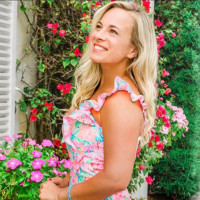
The beginning of Madeline Settles’ journey with endometriosis was similar to what other women with the disease have experienced.
“As a teenager and in college, I knew I had extremely painful periods, but I was really naïve to it all,” Settles said.
Her husband, whom she’s been with since they started dating in high school, didn’t think her periods were typical, but Settles brushed off his concerns.
“I never handled pain well, so I thought maybe I was just being a wimp,” she said. “I’d tell him it was normal to have heavy periods and feel what I was feeling. Maybe mine were a little worse, but that’s just how it was.”
Settles would see several gynecologists over roughly the next decade. At no time did they mention the word endometriosis, a term Settles had heard but knew nothing about. Their solution was to prescribe her various forms of birth control, but each one she tried made her feel worse. Settles finally stopped using contraceptives in 2017 when she was 28 to “try to feel normal again.” That’s when the pain hit an unprecedented level.
“When my period came, I was crumpled up on the floor in a fetal position and felt like I’d been hit by a train,” she said. “I realized I couldn’t get through my days the same way I used to. I’d always powered through things, but I couldn’t anymore.”
She continued to suffer each month, her periods heavy and painful. In 2020, more symptoms kicked in, including weight gain, brain fog, fatigue, and bloating. She thought she might have thyroid disease, which her mother had. An ultrasound showed otherwise.
“I had two cysts—they called them endometriomas—one on each ovary, and they were the size of oranges,” Settles said. “I started doing my research to find out what a cyst was and what an endometrioma was. That’s when my husband and I were certain I had endometriosis.”
Settles had surgery in June 2021. The surgeon removed the two endometriomas and discovered stage IV endometriosis throughout Settles’ body on several organs, including as high up as her liver and diaphragm. The surgeon’s primary goal was to free organs that were stuck together.
“But she couldn’t remove all the endo,” Settles said. “She said she’d done a lot of surgeries before, but she wasn’t an endometriosis specialist.”
The surgeon also found that Settles had a low ovarian reserve of eggs. A few months after recovering, Settles, who wanted to have children, met with a fertility specialist. They would do four egg retrieval attempts from January 2022 through January 2023. Each of the first two attempts netted one egg. The last two produced none.
“There was clearly nothing left,” Settles said. “I was 31 at the time, and they said I had the ovaries of someone in her mid-40s. One of my ovaries was pretty much dead.”
Grateful to have retrieved two embryos, one was transferred to Settles in February 2024.
“Even though we were told we had about a 40 to 50 percent chance of it working, especially having severe endometriosis, it worked,” she said. “We were so happy when we made it past the second trimester.”
But at 31 weeks, Settles’ journey took an unexpected and horrific twist.
“I had extreme pain in my abdomen and pelvis—10 out of 10 pain,” Settles said. “I went to the ER three times that week, and each time I mentioned that I had severe endometriosis and asked them if that could be the cause. They said, ‘Oh, no, endometriosis calms down when you get pregnant. There’s no way that can be it.’”
Their conclusion?
“They said I had severe constipation and sent me home each time,” she said.
She left the hospital barely able to walk. She couldn’t lay down. She couldn’t sleep. At the end of that long week, on the night she would give birth, she fainted three times. After the third time, her husband was able to get her into the car and to the hospital.
“It turned out I was bleeding internally over the entire week due to my adhesions and scar tissue from the endometriosis and the surgery I’d had for it,” Settles said. “My bowels and bladder had adhered to my uterus, and while my uterus was growing during my pregnancy, it was tearing those organs apart.”
This is the first time Settles has shared her story publicly since her son was born that evening in September, two months early.
“My son and I almost died that night,” Settles said, fighting through tears. “We both had to have blood transfusions. He was in the NICU for about a month. It was very, very difficult.
“All the doctors and nurses were in awe because they said they’d never seen or heard of anything like it,” she continued. “I obviously was grateful that my baby and I were alive, but I was angry and frustrated that nobody could have known this was going on. And through it all, I trusted everyone.”
With her son home and healthy now, Settles is speaking out.
“I needed to share this with somebody because I don’t want this to happen to other people,” she said. “I want doctors and surgeons to be aware that this can happen, to know that I was gaslighted during my pregnancy by being told I had constipation when I was bleeding internally. And anyone feeling symptoms needs to take them seriously and talk to everybody, not just doctors. It’s important to have the support of people you can trust who know what you’re going through.”
With the disease still in her body, Settles’ endometriosis journey continues. She’s on birth control that she can tolerate, so the pain has lessened, but her periods are still heavy. A checkup in November revealed that cysts are forming, and she may also have adenomyosis.
“I’m looking into another surgery,” she said. “I’ll be prepared to do whatever I have to do. Right now, though, I’m just feeling grateful that I have a healthy baby.”
*Patient stories submitted to EndoFound.org are the patient's views, not necessarily those of the foundation. All testimonials are from real patients, may not reflect the typical patient’s experience, and are not intended to represent or guarantee that anyone will achieve the same or similar results.









